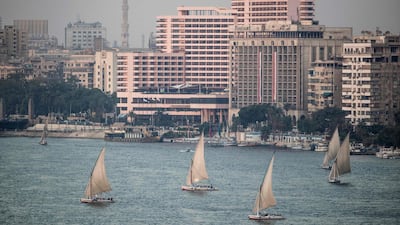The International Monetary Fund is in talks with Egypt for new arrangements to continue helping the country with its economic reforms as its current $12 billion assistance programme expires next month.
Egyptian authorities and the Washington-based lender are discussing the next round of key reforms aimed at boosting economic growth and exploring ways to continue co-operation once the country's three-year programme ends in November, Jihad Azour, director of the IMF's Middle East and Central Asia Department, said in an interview in Dubai.
"The authorities have expressed interest in a new arrangement," Mr Azour told The National. "At this stage we're discussing with the authorities what are the reform priorities, what are the key reforms they have, and based on the progress, together we'll define what is going to be the type of arrangement we will have with them."
Egypt signed a three-year, $12bn Extended Fund Facility in November 2016 to revive its economy through tough reform measures. The government devalued its currency and cut subsidies at the end of 2016 to secure the loan agreement, followed by further spending cuts. The reforms helped end a major dollar shortage, repaired overburdened finances and pulled the country out of an economic crisis, although Egyptians have felt pressured by the austerity measures.
"For us it's very important that the next wave of reforms will address some of the impediments to growth by reforming the business environment, allowing the private sector access to greater market share and by improving the environment for doing business in Egypt," Mr Azour said. "Structural reforms will be aimed at increasing growth and making it more job-rich."
Reforms must target inclusive growth — meaning re-examining the extent of the state's involvement in the economy and providing a bigger role for the private sector. Egypt must also address "historical bottlenecks" for private investment, invest in education and improve access to talent, he said.
Mr Azour said there is no time frame for concluding the discussions, adding "we are progressing".
The Fund projects Egypt's economy will expand 5.5 per cent this year, up from 5.3 per cent in 2018, and grow 5.9 per cent in 2020. Inflation in 2019 would reach 11.4 per cent before dropping to 8.4 in 2020, according to its regional economic outlook published earlier this month.
The economies of the Arabian Gulf are projected to grow 0.7 per cent in 2019, down from 2 per cent last year, before rebounding to 2.5 per cent in 2020, the IMF said. The economic recovery next year will be driven by growth in the non-oil sector and a rebound in oil gross domestic product.
The non-oil sector will grow from 1.9 per cent this year to 2.4 per cent in 2019 and 2.8 per cent in 2020, spurred by infrastructure spending in countries such as Kuwait, and a tourism boost in the UAE gained from Dubai hosting the Expo 2020, the IMF said.
Non-oil sector growth "shows the reforms that had been introduced are starting to yield results", Mr Azour said, referring to GCC-wide economic overhauls to reduce reliance on oil.
Oil GDP growth will shrink 1.4 per cent in 2019 because of high volatility in oil prices and the reduction in oil production due to the extension of the Opec+ agreement, he said. It is forecast to recover in 2020 to 2.1 per cent.
"We expect that next year, with expiration of the Opec+ agreement, production will recover and we expect the increase in non-oil sector will bring overall economic growth up," he said.
In Saudi Arabia, the Vision 2030 economic reforms are "yielding results" and, along with fiscal expansion, are leading to non-oil sector growth of 2.7 per cent.
The IMF urged Gulf countries to forge ahead with plans for economic diversification from oil, such as improving access to finance for small-to-medium enterprises, increasing access to talent and investing in fast-growing tech sectors.
Saudi Arabia's efforts to develop its service sectors by opening the kingdom to tourists and expanding retail are "steps in the right direction", Mr Azour said.


